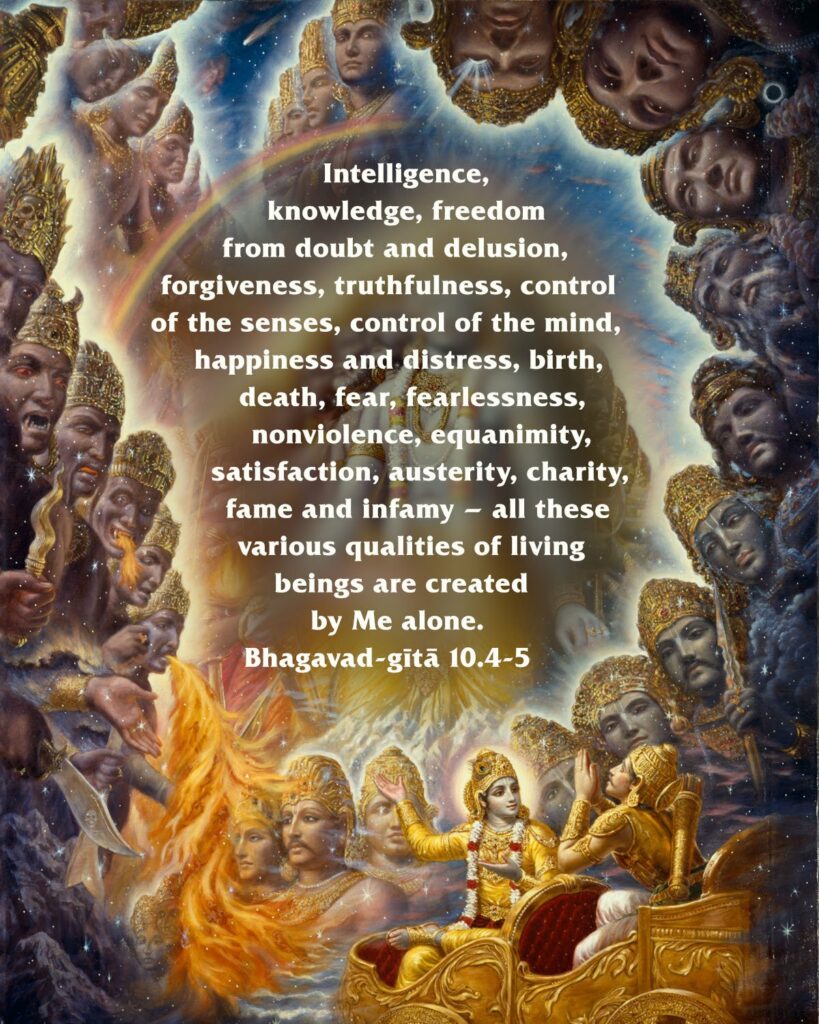बुद्धिर्ज्ञानमसम्मोह: क्षमा सत्यं दम: शम: |
सुखं दु:खं भवोऽभावो भयं चाभयमेव च || 4||
अहिंसा समता तुष्टिस्तपो दानं यशोऽयश: |
भवन्ति भावा भूतानां मत्त एव पृथग्विधा: || 5||
buddhir jñānam asammohaḥ kṣhamā satyaṁ damaḥ śhamaḥ
sukhaṁ duḥkhaṁ bhavo ’bhāvo bhayaṁ chābhayameva cha
ahinsā samatā tuṣhṭis tapo dānaṁ yaśho ’yaśhaḥ
bhavanti bhāvā bhūtānāṁ matta eva pṛithag-vidhāḥ
buddhiḥ—intellect; jñānam—knowledge; asammohaḥ—clarity of thought; kṣhamā—forgiveness; satyam—truthfulness; damaḥ—control over the senses; śhamaḥ—control of the mind; sukham—joy; duḥkham—sorrow; bhavaḥ—birth; abhāvaḥ—death; bhayam—fear; cha—and; abhayam—courage; eva—certainly; cha—and; ahinsā—nonviolence; samatā—equanimity; tuṣhṭiḥ—contentment; tapaḥ—austerity; dānam—charity; yaśhaḥ—fame; ayaśhaḥ—infamy; bhavanti—arise; bhāvāḥ—qualities; bhūtānām—amongst humans; mattaḥ—from me; eva—alone; pṛithak-vidhāḥ—varieties of
Translation:
From Me alone arise the varieties of qualities in humans, such as intellect, knowledge, clarity of thought, forgiveness, truthfulness, control over the senses and mind, joy and sorrow, birth and death, fear and courage, non-violence, equanimity, contentment, austerity, charity, fame, and infamy.
Commentary:
Sixteen good qualities and four bad qualities are mentioned in these two verses. All these qualities proceed from the Lord Himself. What does this mean? It does not mean that God gives good qualities to some people and bad qualities to others. He has already declared “There is no one hateful or dear to Me.” This being so, the qualities exhibited by different people are the result of their own thoughts and actions. Men who contemplate the righteous become good, possessing all divine qualities, and others who think and act in the opposite direction becomes bad, possessing undivine qualities. It is by the Lord’s power that these qualities, good and bad come to man, though the Lord is just a witness only and is not affected by them. The Lord does not cause karma. He is not the doer of karma, (‘karmakarta‘). He is the dispenser of the fruits of the action (‘karmaphalapradata‘). It is in this sense that we have to understand the Lord’s declaration.
Moreover, the mind is in itself insentient, and it is animated by the life-force of the Lord. As the iron-needle moves by the nearness of the magnet, the presence of Atma makes the mind active according to its own nature. Therefore the Lord here says that from Him arise all the different qualities of mortals. Indeed Atma (the Lord) does not cause them nor prompt them. The Sun has nothing to do with the actions of mortals in the world, nor has the theatre-light anything to do with the actions performed on the stage.
Buddhi is the ability to analyze things in their proper perspective.
Jñānam is the ability to discriminate spiritual from material.
Asammoham is the absence of confusion.
Kṣhamā is the ability to forgive those who have harmed us.
Satyam is the veracity to declare the truth for the benefit of all.
Dam means restraining the senses from the sense objects.
Śham is restraint and control of the mind.
Sukham is the emotion of joy and delight.
Duḥkham is the emotion of sorrow and affliction.
Bhavaḥ is the perception of one’s existence “I am.”
Abhāvaḥ is the experience of death.
Bhaya is the fear of oncoming difficulties.
Abhaya is freedom from fear.
Ahinsā is abstinence from harming any being through word, deed, or thought.
Samatā is equanimity in good and bad situations.
Tuṣhṭi is feeling content in whatever comes by ones karma.
Tapa is voluntary austerities for spiritual benefit, in accordance with the Vedas.
Dān is giving in charity to one who is worthy.
Yaśh is fame arising from possessing good qualities.
Ayaśh is infamy for possessing bad qualities.
Bhagavad Gita: Chapter 10 🔻 (42 Verses)
